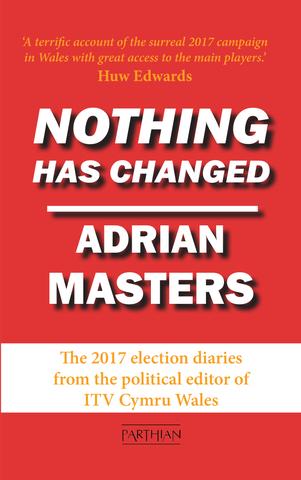Leighton Andrews reviews Nothing Has Changed by Adrian Masters, a thoughtful account of the 2017 election by the political editor of ITV Cymru Wales.
Adrian Masters has always been one of the most thorough of interviewers in Welsh broadcasting – fair, but firm. His infamous red notebooks contain many secrets, some of which he shares – without revealing sources where they didn’t want to be named – in this volume of his 2017 election diaries.
His title Nothing Has Changed of course comes from the statement by the Prime Minister after she reversed her disastrous manifesto pledge on social care during the election campaign. By the early hours of 10 June, however, as Masters says, ‘Everything has changed’.
 This was an election which, as the author reminds us, the Conservatives started well-ahead of Labour in the polls and senior Labour figures thought that the party would do well to hold 200 seats. ITV Wales’ own Yougov poll had the Tories well ahead of Labour at the beginning of the campaign, poised to win 21 seats.
This was an election which, as the author reminds us, the Conservatives started well-ahead of Labour in the polls and senior Labour figures thought that the party would do well to hold 200 seats. ITV Wales’ own Yougov poll had the Tories well ahead of Labour at the beginning of the campaign, poised to win 21 seats.
Though the substantive election inquests have yet to be published, this election seems to have been one of two halves, reflected in the cross-over in the opinion polls and the dramatic final outcome. Nothing Has Changed takes us back to the days before the election, which genuinely seem like a different electoral world. As he says, ‘Certainties have been lost, rules bent or broken and leaders have risen and fallen.’ His account starts with the terrorist incident in Westminster, moves through the death of Rhodri Morgan and the further terrorist outrage in Manchester, and concludes with Labour picking up Welsh seats like Vale of Clwyd, Gower and Cardiff North.
Masters is in no doubt that the Labour surge can be put down to changing and more positive reactions to Jeremy Corbyn’s performance, a strong showing by Welsh Labour under Carwyn Jones’ leadership, and argues that ‘the tributes to Rhodri Morgan also cemented the view of Welsh Labour being different.’
Where Masters scores most heavily in these diaries is on background colour. Messages coming in from different party representatives, both elected and backroom, which may have surfaced on Masters’ Twitter feed at the time but may not have made it into broadcast reports. Things that Masters was told then on background now surface – unattributed – in their mistaken glory in Nothing Has Changed. What is written from a Labour perspective reflects conversations I was having with people at the time, but it is interesting to get an all-round view of how Conservative, Plaid and other party insiders were feeling. I can make guesses at some of the sources on the Labour side in particular, but while Masters quotes them here to give a sense of the contemporary mood, he doesn’t embarrass them with personal unmasking. Nor would you expect him to do so.
Where people were willing to be quoted, Masters makes good use of the material he’s gathered in Nothing Has Changed. ‘By any sensible consideration, I’m toast,’ says Paul Flynn (MP for Newport West) at one point. Later in the campaign he tells Masters: ‘More optimistic now. There is a favourable Welsh dimension because of Carwyn and memories of Rhodri.’ As late as the last week of the campaign a Conservative AM says that they now think they will elect ‘a rugby team and a few reserves’. They went down to eight.
Masters’ personal account of the ITV Wales debate is fascinating, and gives a good sense of the challenges facing a broadcast journalist trying to both maintain balance and keep the flow of the debate. His account of the behind-the-scenes row within the Conservative Party as to whether Andrew RT Davies or Alun Cairns was to appear for them is entertaining and becomes a subplot within the text, as does Masters’ battle to get an interview with the Prime Minister. Campaign insider accounts of the use of Facebook and social media to mobilise young people are interesting and valuable.
Throughout this book, Masters demonstrates what a good print journalist he could have been. His account is pacy, well-written and thoughtful, with contemplative passages added to the contemporary diary and reconstructed notes. Reading it in the aftermath of Carl Sargeant’s tragic death made me reflect on how long ago it all now feels. Yes, everything has changed.
Nothing Has Changed is available now from Parthian Books










